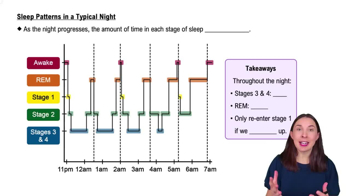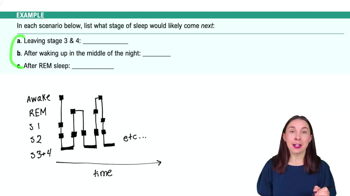Table of contents
- 1. Introduction to Psychology1h 43m
- 2. Psychology Research2h 20m
- 3. Biological Psychology2h 41m
- 4. Sensation and Perception28m
- 5. Consciousness and Sleep32m
- 6. Learning41m
- 7. Memory34m
- 8. Cognition37m
- 9. Emotion and Motivation35m
- 10. Developmental Psychology33m
- 11. Personality48m
- 12. Social Psychology41m
- 13. Stress and Health41m
- 14. Psychological Disorders44m
- 15. Treatment47m
5. Consciousness and Sleep
Sleep
Struggling with Psychology?
Join thousands of students who trust us to help them ace their exams!Watch the first videoMultiple Choice
The minor tranquilizers are
A
commonly used to treat anxiety.
B
not addictive.
C
not dangerous.
D
dangerous even in small doses.
 Verified step by step guidance
Verified step by step guidance1
Understand the context of minor tranquilizers: These are medications often prescribed to manage anxiety and other related conditions.
Recognize the characteristics of minor tranquilizers: They are known for their calming effects and are typically used to treat anxiety disorders.
Consider the potential for addiction: While minor tranquilizers can be effective, they may have a risk of dependency or addiction if not used as prescribed.
Evaluate the safety profile: Minor tranquilizers are generally safe when used under medical supervision, but misuse or overuse can lead to adverse effects.
Reflect on the dosage implications: While they are effective in prescribed doses, taking them inappropriately or in large amounts can be dangerous.

 3:25m
3:25mWatch next
Master Circadian Rhythms with a bite sized video explanation from Hannah Gordils
Start learningRelated Videos
Related Practice


































































































![Race, Genes and IQ Differences | Bret Weinstein [Mini Clip]](https://img.youtube.com/vi/IztL_m3pd70/mqdefault.jpg)



































































































